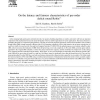Free Online Productivity Tools
i2Speak
i2Symbol
i2OCR
iTex2Img
iWeb2Print
iWeb2Shot
i2Type
iPdf2Split
iPdf2Merge
i2Bopomofo
i2Arabic
i2Style
i2Image
i2PDF
iLatex2Rtf
Sci2ools
120
click to vote
COMCOM
2004
2004
On the latency and fairness characteristics of pre-order deficit round Robin
In the emerging high-speed packet-switched networks, fair packet scheduling algorithms in switches and routers will form an important component of the mechanisms that seek to satisfy the Quality of Service (QoS) requirements of various applications. The latency bound of a scheduling discipline is an important QoS parameter, especially for real-time playback applications. Frame-based schedulers such as Deficit Round Robin (DRR), though extremely efficient with an O(1) dequeuing complexity, lead to high latencies due to bursty transmissions of each flow's traffic. In recent work by Tsao and Lin [Computer Networks 35 (2001) 287], the authors propose a novel scheme, called Pre-order DRR, which overcomes this limitation of DRR while still preserving a low work complexity. In Pre-order DRR, a priority queue module, appended to the original DRR scheduler, re-orders the packet transmission sequence and thus distributes the output more evenly among flows, reducing burstiness and improving...
| Added | 17 Dec 2010 |
| Updated | 17 Dec 2010 |
| Type | Journal |
| Year | 2004 |
| Where | COMCOM |
| Authors | Salil S. Kanhere, Harish Sethu |
Comments (0)

